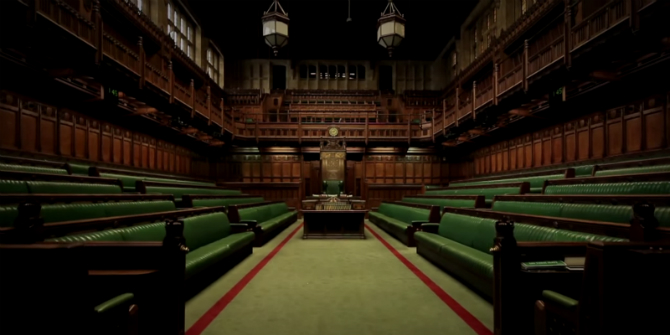 Can the EU deliver on the left-wing promise of a “Europe for the many”? The LSE’s 16th Continental Breakfast addressed four key left-wing policy areas: macroeconomic policy, local socioeconomic development, public services, and green growth. One dilemma arose time and again in the discussion – whether left-wing parties should push for incremental or radical change in the EU. Kira Gartzou-Katsouyanni (LSE) reports.
Can the EU deliver on the left-wing promise of a “Europe for the many”? The LSE’s 16th Continental Breakfast addressed four key left-wing policy areas: macroeconomic policy, local socioeconomic development, public services, and green growth. One dilemma arose time and again in the discussion – whether left-wing parties should push for incremental or radical change in the EU. Kira Gartzou-Katsouyanni (LSE) reports.
Europe and the Left
The question of Europe has challenged left-wing parties for decades. From the French Socialists under François Mitterrand in the 1980s to the British Labour Party under Jeremy Corbyn today, left-wing parties throughout Europe have hotly debated whether the EU is the quintessence of unmitigated globalised capitalism that puts profit over people, or our best defence against it.
This debate has acquired an almost existential importance in recent years, as mainstream left-wing parties across Europe have seen their vote shares plummet. And while in the past, it was the social democrats’ generally pro-EU stance that was attacked from the radical right, the last two years have seen the emergence of electorally effective alternatives to social democracy at the staunchly Europhile end of the spectrum, such as Macron’s En Marche in France and the Greens in Germany.
If, as Liesbet Hooghe and Gary Marks suggest, European countries are currently witnessing “the emergence of a transnational cleavage” centred around the issues of European integration and immigration, then it is more urgent than ever for the European left to convey a clear vision about Europe. So can the EU deliver on the promise of a “Europe for the many”?
Reforming macroeconomic policy
One of the most fundamental left-wing concerns about the EU’s institutional framework is that EU treaties entrench and in effect give constitutional status to particular ideas about economic policy, many of which are conservative in nature. This is a manifestation of a broader, global phenomenon, which can be described as the encasement of free markets beyond the reach of regulatory democracy.
The design of the EU’s Economic and Monetary Union (EMU) can be seen as a case in point. Although in the context of the recurrent currency crises of the 1980s and early 1990s, EMU was originally widely seen as the best defence at the disposal of countries with “weak” currencies against the growing influence of financial speculators on their economies, the eventual design of EMU in the Maastricht Treaty privileged the economic goals of price stability and fiscal discipline to an extent that left progressives across Europe disillusioned. Monetary policy in the newly-formed Eurozone would be shaped by the European Central Bank (ECB), “the most independent Central Bank in the world” by design, which was mandated by the Treaty to regard price stability as its primary objective.
Moreover, the monetary union would not be complemented with an ambitious economic union that would include an EU fiscal capacity to cushion asymmetric shocks in particular member-states; instead, the treaty emphasised national fiscal discipline, a goal that was enshrined in the convergence criteria that member-states had to meet in order to qualify for Eurozone membership, and that was later reaffirmed in the Stability and Growth Pact adopted in 1997.
As Kathleen McNamara has argued powerfully in The Currency of Ideas, in the context of the economic difficulties that many European countries were experiencing since the late 1970s, these choices at least partly reflected “a convergence in policy preferences among European elites” around the monetarist paradigm of macroeconomic policy, whereby Keynesian demand management had come to be seen as an ineffective tool to promote growth. The emphasis on monetary stability as a way of ensuring the undistorted operation of the price mechanism, and on fiscal discipline as a way to assign liability to individual member-states for their own economic policy choices, was also very much in line with ordo-liberal economic philosophy as developed by Walter Eucken and the Freiburg school.
What happens when the consensus around the ideational underpinnings of EMU as it was designed in Maastricht unravels, as a result of political change, economic crisis, or a combination of the two? Given the embeddedness of some of these ideas in the EU’s treaties, is there scope for change, short of a radical treaty reform?
Interestingly, and contrary to popular belief, the EMU’s architecture did in fact change during the Eurozone crisis. The no-bailout clause of the Maastricht Treaty, which stated that no member-state was under an obligation to assume the debt of another member-state, became defunct in practice when five EU member states were bailed out through the series of emergency funds that were created since 2010. In fact, the European Stability Mechanism (ESM), which was set up as a permanent institution in 2012, created “for the first time a permanent capacity for fiscal risk sharing if a member-state government is in distress”. Moreover, under the presidency of Mario Draghi, the European Central Bank (ECB) moved away from a narrow conception of its role as being solely that of the guarantor of price stability, and played a crucial part in the eventual recovery of the Eurozone.
Despite the prohibition of monetary financing of EU member-states at Maastricht, the ECB started purchasing member-state government bonds in the secondary bond market through its Outright Monetary Transactions (OMT) programme in 2012, and engaged in quantitative easing in 2015. According to Waltraud Schelkle, these examples demonstrate that “there is no finalité in monetary integration”: the EMU’s institutional architecture is constantly evolving.
It is of course true that these developments came hand-in-hand with an unprecedented level of conditionality for debtor member-states, including requirements not only for structural reforms, but also for austerity and privatisation. Moreover, the Fiscal Compact signed by EU member-states in 2012 not only reaffirmed their commitment to fiscal discipline, but it also created a constitutional requirement for member-states to hold a balanced budget over the economic cycle. At the same time, more ambitious proposals for creating a fiscal stabilisation mechanism that would enable member-states to smooth their business cycle even when their public finances are not in such a grave state that a resort to the European Stability Mechanism is required, such as the much-discussed proposal for a European Unemployment Benefit Scheme, appear politically unattainable at the moment.
The member states’ apparent reluctance to move ahead with such a reform is related to concerns in creditor states that an EU-level unemployment benefit scheme would generate moral hazard, in the form of perverse incentives for member states to avoid implementing reforms to tackle unemployment at home. In turn, these concerns point to a more fundamental issue, namely the profound challenge of forging political alliances for reform in an entity such as the EU, which is not single, homogeneous democracy, but a union of democracies where the democratic will of one people is often at odds with the democratic will of other peoples.
In such a context, if an agreement for progressive reform is going to be forged, the concerns of voters in the creditor states will somehow have to be addressed, and the argument will have to be won within a broad European alliance, rather than from the relative isolation within which the UK Brexit debate is usually conducted. The Portuguese Prime Minister António Costa can be seen as a good example of a socialist politician who is currently working discreetly but persistently in that direction, building his credibility by supporting the EMU’s rules on fiscal discipline, while pushing for the adoption of a formula of “ordoliberalism at home; Keynesianism on the European scale”.
Promoting local socioeconomic development
If reforming the direction of macroeconomic policy is an issue that must be tackled primarily at the European level, this is not necessarily true for another policy aim that is at the core of the Left’s agenda – namely the aim of fostering socioeconomic development, particularly in areas that have suffered from industrial decline, where there is a feeling of being left behind by an economic model that relies heavily on linkages with global markets. This goal is becoming more pressing than ever in light of recent electoral outcomes. While people voted Leave in the 2016 referendum for very different reasons, scholars such as Will Jennings and Andrés Rodríguez-Pose have shown that one of the most notable spatial dimensions of the vote was that places that have experienced a high relative socioeconomic decline in recent decades were much more likely to vote Leave than areas with strong global links.
The concern is that while those communities managed to find a voice by voting Leave, they will now get the wrong medicine in the form of Brexit. Take the example of Mansfield in Nottinghamshire, formerly a major centre of coal mining, which has faced a protracted period of relative economic decline since the late 1980s and which voted 70.9% Leave. The Leave vote and the reaction of the local community against the arrival of Eastern European immigrants in the town in the early 2000s can at least partly be understood as an aspect of a broader reaction against the spread in the area of a type of business model that relies on low-skilled, low-paid labour recruited on zero-hour contracts via agencies.
However, Brexit in itself will solve none of the underlying structural problems of Mansfield’s economy, and may actually exacerbate some of the challenges that high value-added firms and public services face in the area, especially by reducing their ability to find skilled workers. Furthermore, while an increase in the barriers to the free movement of people is likely to disrupt the kind of low-value-added business model that the locals seem to have reacted against, it is by no means certain that after Brexit, a better type of business model would take its place – or anything at all. Brexit will also signify the loss of the area’s EU funding, which currently subsidises precisely the types of activities that can promote development along a higher value-added path, such as training and start-up support programmes.
Finally, at a more general level, quantitative impact assessments of the local-level effects of both “soft” and “hard” Brexit scenarios, such as the one conducted by the LSE’s Centre for Economic Performance, predict that economic activity in local authorities throughout the country will be affected negatively by the increase in trade barriers with the EU that will result from Brexit.
Given that the UK is a net contributor to the EU budget, in theory British governments would have the means to replace and even expand and improve the EU’s regional development programmes after Brexit – and indeed, scholars of regional development have strongly encouraged a cross-party consensus to that direction, given evidence that EU programmes provided a mechanism for dampening the forces of economic divergence within the UK in the past. However, in practice, the historical reluctance of successive British governments to fund stable, long-term regional development programmes involving local stakeholders in the planning and implementation stages – perhaps with the exception of the establishment of the nine Regional Development Agencies under Tony Blair – creates reasons for serious concern. In fact, the government’s recent announcement of the £1.6bn Stronger Towns Fund to reward Leave-voting Labour constituencies if Theresa May’s Brexit deal passed from Parliament, was an alarming illustration of what the UK’s regional development policy may look like after Brexit: a series of short-term responses to immediate political problems, not a long-term strategy for achieving a set of well-defined, equitable socioeconomic goals at local level.
But can any type of regional development policy within the EU’s free-market framework ever be enough to provide declining regions with the boost that they need in order to catch up with other parts of the country? And more particularly, are the EU’s current rules on state aid compatible with adopting effective policies to address regional inequality? One hears a range of views on this question within the British Left. Some argue that the EU’s state aid rules must be reformed in order to be compatible with a left-wing policy for regional development. One reform proposal is to introduce an exemption from current state aid rules in the EU’s treaty, which would allow governments to provide companies with subsidies for up to five years, “in so far as such aid is required in order to compensate for severe economic disadvantages or impacts caused by industrial, sectoral or other major structural change or by sharp economic fluctuations or disturbances (including those resulting from any impact of trade with third countries).”
On the other hand, others argue that the British debate on state aid often underestimates the extent to which the EU’s state aid rules serve to limit the practice of corporate welfare in European countries, thereby stopping “private capital capturing governments to enrich itself at society’s expense” – something that happens a lot more often in the US, which doesn’t have an equivalent framework for state aid rules. Having said that, given the ongoing debate about state aid rules in Germany, where there is concern about the ability of European companies to rival Chinese competition, reform of the EU’s state aid rules may not be impossible.
Finally, whether some reform of the EU’s state aid rules is required from a left-wing perspective or not, the British Left should support ongoing EU efforts to address “the gaping hole in the present system” – namely that “states remain able to offer enticements through undercutting other states on corporate profit tax rates” – and ask that initiatives such as the Anti-Tax Avoidance Directive that recently became effective in UK law, or the Commission’s proposal for a Common Consolidated Corporate Tax Base, become even bolder in terms of ensuring that companies operating in the EU pay their fair share of tax.
Improving public services
A promising way to think about improving public services is to look for allies among European cities that are pioneers in the domain of public service provision, learn from their experience, and seek to understand what policies can be adopted at the EU level in order to foster those cities’ efforts and encourage the adoption of similar policies in other cities. This strategy appears to be grounded and realistic but at the same time it has a visionary element, as it brings policy-makers closer than ever to citizens and their communities, who become actively involved in the process of policy design.

Vienna is widely recognised as one of Europe’s best-performing cities in terms of the quality of its public services, and this is one of the reasons why the city “effortlessly tops the world’s most liveable city surveys”. With nearly two-thirds of Vienna’s citizens living in municipal or publicly-subsidised housing, resulting in an abundance of affordable, high-quality housing throughout Vienna that Londoners could only dream of, the city’s public housing programme can arguably be characterised as its flagship achievement – but public housing also goes hand-in-hand with a remarkable offering in terms of public utilities, public transportation, and a range of city-level policies to protect the environment and create green spaces.
Fostering green growth
Climate change policy and green growth are issues that also occupy a central place in current left-wing discussions. A European approach to these questions could be summarised as a call for the Green New Deal to be framed as a European deal, building and expanding on the EU’s comparatively ambitious climate change goals, and its environmental legislation that is “almost universally based on the high standards of the most environmentally advanced member states, such as Denmark, Germany, Sweden, and the Netherlands, rather than on the lower standards of the UK, Ireland, and Southern and Eastern Europe”.
Even if the EU’s environmental policies are relatively advanced in terms of legislation, they suffer from an implementation problem. This is an area where the Left can ask the EU to do more, addressing the root causes of the implementation deficit, including administrative incapacity, the resistance of groups with vested interests in the continuation of environmentally damaging policies, and the lack of environmental awareness in many parts of Europe. More ambitiously, a transformative European Green New Deal would involve broader change in a number of neighbouring policy areas at both the national and the EU levels, including transportation, energy, housing, public procurement, and even corporate governance. Crucially, for any such effort to succeed, the goals of environmental protection and social justice would have to be pursued in tandem, involving the citizens as agents of change.
Making change happen
Like the current discussion within the British Left, this report has oscillated between suggesting grounded, incremental reforms to the EU’s policy status quo and bold, visionary policy changes that would require a radical overhaul of the existing EU policy framework. In the end, should the European Left push for incremental or radical reform? Which of the two has the potential to reverse the Left’s electoral decline and to make a real difference in people’s livelihoods? Can these two visions of reform somehow be combined?
One view is that the Left has contented itself with adopting an incremental, pragmatic approach for too long, and that this stopped it – among other things – from coming up with a convincing response to the global financial crisis. What is needed instead, it is argued, is decisive leadership and a vision for radical change, like the leadership and vision that Roosevelt displayed when he dismantled the system of the Gold Standard almost overnight. Others are wary of such suggestions for radical reform, arguing that real, lived EU politics require the careful construction of pan-European political alliances to build on what works and nudge agendas in a progressive direction. Focusing on small steps that can deliver material benefits in the present doesn’t necessarily imply the lack of a vision about the desirable direction for European politics, but conveying such a vision would crucially require a narrative that builds upon the positive elements of European integration.
What is more, communicating such a vision effectively would likely depend upon all of us – scholars, politicians, policy-makers at the national and crucially at the EU level – making it a far more central part of our daily work to listen, learn from and engage with citizens and local communities across the European Union.
This post represents the views of the author and not those of the Brexit blog, nor the LSE. It is part of the Continental Breakfasts series. For the full-length report on this event, please see the write-up.
Kira Gartzou-Katsouyanni is a PhD candidate at the European Institute. Her doctoral research focuses on the political economy of local development in Southern Europe.






